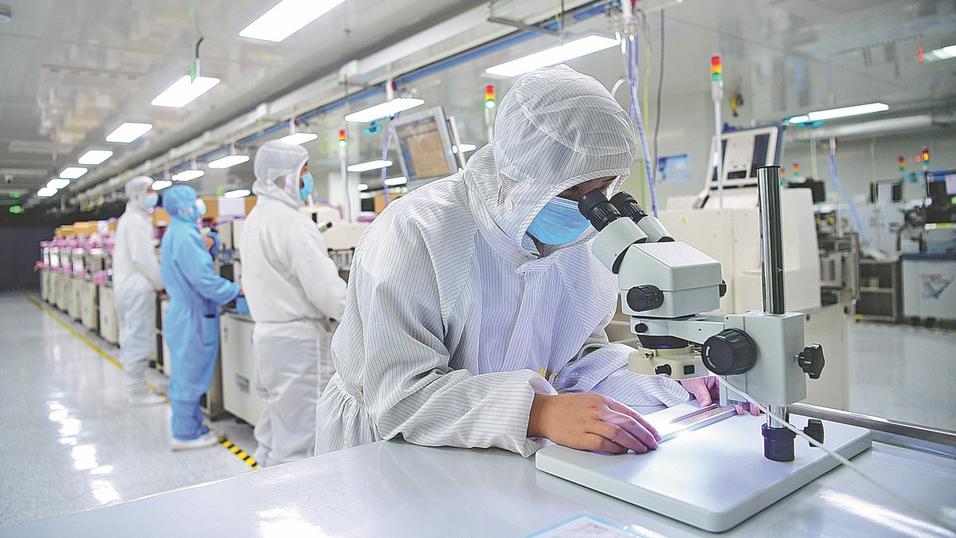 Technicians oversee chip manufacturing at a tech company in Ganzhou, Jiangxi province. (PHOTO BY ZHU HAIPENG / FOR CHINA DAILY)
Technicians oversee chip manufacturing at a tech company in Ganzhou, Jiangxi province. (PHOTO BY ZHU HAIPENG / FOR CHINA DAILY)
Just as chipmakers in the United States compete for billions of dollars in subsidies to boost domestic manufacturing, the industry is confronted with a problem: sudden shrinking demand.
US President Joe Biden signed the Chips and Science Act into law last month to counter China's technological development.
With up to US$52 billion in subsidies on offer, the White House said the assistance will also help address the chip shortages that have plagued many industries and insulate the country from future supply chain disruptions in East Asia.
Industry experts say the legislation represents a major US government intervention in industrial development and economic policy, and they warn it may lead to unintended consequences.
But now experts are pointing to the sudden drop in demand for chips. Among the factors behind this change is the rapid buildup in inventory in the supply chain since early this year.
Another cause is the weaker demand for personal computers, smartphones and other devices as consumers cut back on purchases and manufacturers reduce production because of recession fears.
Chip designer Nvidia has reported that its gaming unit's revenue declined 44 percent from the previous quarter, while Micron Technology, the leading maker of memory chips, has said demand is falling off rapidly.
The abrupt shift comes as chipmakers in the US are poised to start adding new capacity with funding from the Chips and Science Act. Work will get underway on 24 large plants this year, according to chip-equipment industry association SEMI.
The semiconductor industry has historically been cyclical, and the cyclical nature will continue despite the new funding, John Abbott, an analyst at S&P Global Market Intelligence, said in a blog on Aug 22.
ALSO READ: China strongly opposes US chips bill
In a year or two, we are likely to see a glut of capacity, at least temporarily, which will test the resolve of those companies that have committed to expensive buildouts. Protectionist conditions attached to the subsidies might force the chip industry to restrict overseas partnerships and sales.
John Abbott, analyst at S&P Global Market Intelligence
"In a year or two, we are likely to see a glut of capacity, at least temporarily, which will test the resolve of those companies that have committed to expensive buildouts," he wrote.
The legislation provides that companies cannot receive subsidies if they build new semiconductor production capacity in China or expand existing capacity.
"Protectionist conditions attached to the subsidies might force the chip industry to restrict overseas partnerships and sales," Abbott wrote. "If US chip companies can no longer sell to China, they miss out on the largest market for their products."
The global chip shortage since the start of the pandemic has hit many industries hard, particularly the automotive industry. Those disruptions made the policymakers realize the importance of chips and helped drive the rapid passage of the act through Congress.
"But it is difficult to find a rationale from the pandemic for subsidizing semiconductor manufacturing," Alan Sykes, a law professor at Stanford University, wrote in a recent article on the legislation.
"Government efforts to 'pick winners and losers' may simply dissipate resources and achieve little in practice even from the parochial perspective," he said. "In that regard, it is hardly clear that chip manufacturing, particularly of the 'commodity' chips that are now most often made overseas, is a good fit for the 'strategic trade' framework."
Sykes compared the Chips and Science Act, which he called "produce American", with former president Donald Trump's "buy American" policy.
"Both have the potential to encourage production by higher cost and less efficient firms, which are competitive only by virtue of the subsidies they receive or the preferences they receive from buyers," said Sykes.
Experts said bringing chip manufacturing back to the US won't fix the chip shortage because supply chains are now very complex and global in nature.
According to a 2020 report by the Global Semiconductor Alliance and Accenture, each segment of the semiconductor value chain has 25 countries involved in the direct supply chain and 23 countries involved in supporting market functions.
The researchers found components for a chip could travel more than 40,000 kilometers before completion, and a semiconductor product could cross international borders 70 or more times before finally making it to the end customer.
READ MORE: US chips in another bill in its zero-sum game
It is very difficult for government to intervene in a technically complex industry without radically disrupting it, said Melissa Griffith, a lecturer in technology and national security at the Johns Hopkins University School of Advanced International Studies.
"You do not want to put yourself in a position where the security policies put limitations, for example, on acquisitions or mergers, on where they can sell certain types of products," she said in a recent webinar.
It would make the companies unviable within the US, because they're not able to innovate or compete, she added.
"It's important to say that the world in which we deem success cannot be 'no China,'" she said. "In your attempts to curtail certain countries' efforts in this space, you may curtail and constrain your own company's efforts in this space."


